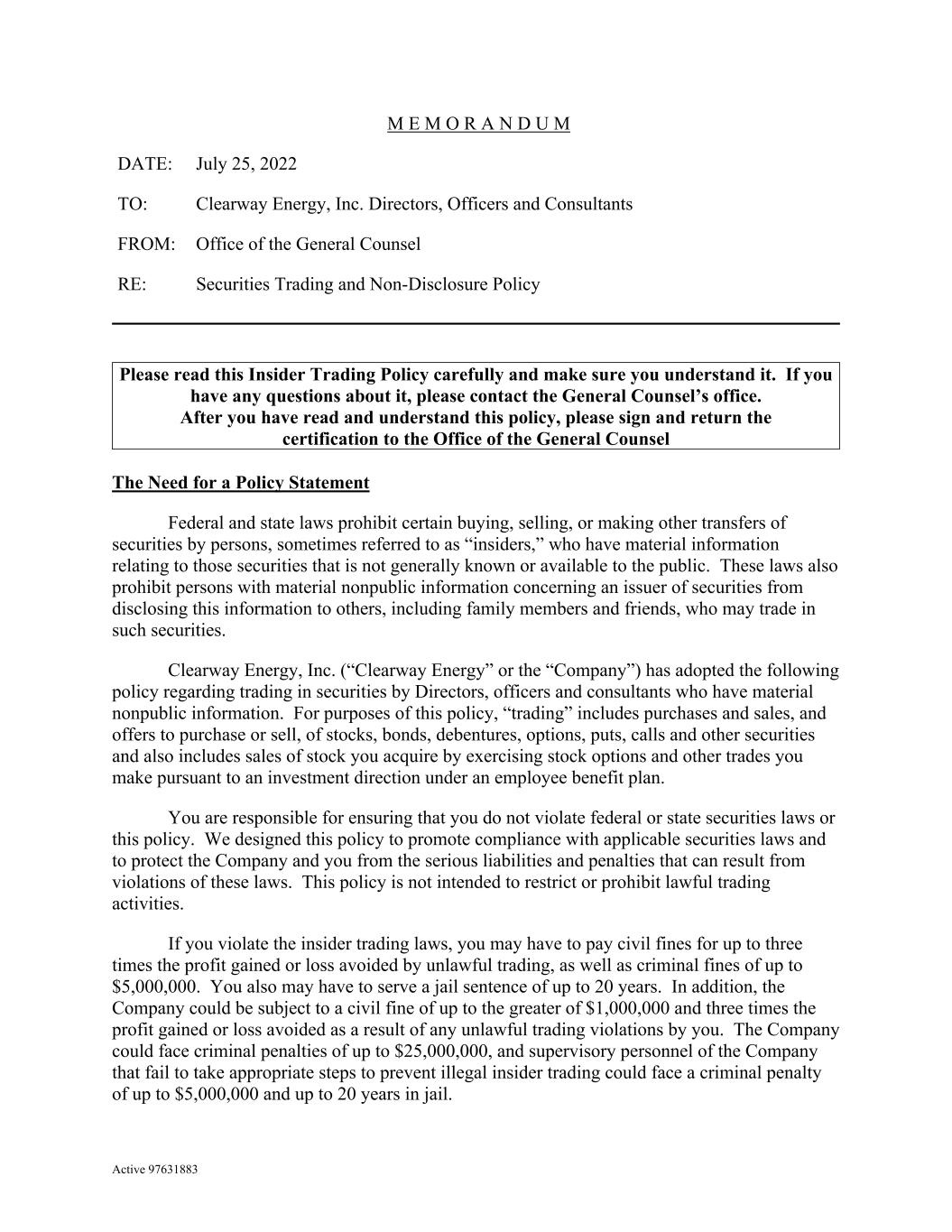
Active 97631883 M E M O R A N D U M DATE: July 25, 2022 TO: Clearway Energy, Inc. Directors, Officers and Consultants FROM: Office of the General Counsel RE: Securities Trading and Non-Disclosure Policy Please read this Insider Trading Policy carefully and make sure you understand it. If you have any questions about it, please contact the General Counsel’s office. After you have read and understand this policy, please sign and return the certification to the Office of the General Counsel The Need for a Policy Statement Federal and state laws prohibit certain buying, selling, or making other transfers of securities by persons, sometimes referred to as “insiders,” who have material information relating to those securities that is not generally known or available to the public. These laws also prohibit persons with material nonpublic information concerning an issuer of securities from disclosing this information to others, including family members and friends, who may trade in such securities. Clearway Energy, Inc. (“Clearway Energy” or the “Company”) has adopted the following policy regarding trading in securities by Directors, officers and consultants who have material nonpublic information. For purposes of this policy, “trading” includes purchases and sales, and offers to purchase or sell, of stocks, bonds, debentures, options, puts, calls and other securities and also includes sales of stock you acquire by exercising stock options and other trades you make pursuant to an investment direction under an employee benefit plan. You are responsible for ensuring that you do not violate federal or state securities laws or this policy. We designed this policy to promote compliance with applicable securities laws and to protect the Company and you from the serious liabilities and penalties that can result from violations of these laws. This policy is not intended to restrict or prohibit lawful trading activities. If you violate the insider trading laws, you may have to pay civil fines for up to three times the profit gained or loss avoided by unlawful trading, as well as criminal fines of up to $5,000,000. You also may have to serve a jail sentence of up to 20 years. In addition, the Company could be subject to a civil fine of up to the greater of $1,000,000 and three times the profit gained or loss avoided as a result of any unlawful trading violations by you. The Company could face criminal penalties of up to $25,000,000, and supervisory personnel of the Company that fail to take appropriate steps to prevent illegal insider trading could face a criminal penalty of up to $5,000,000 and up to 20 years in jail.
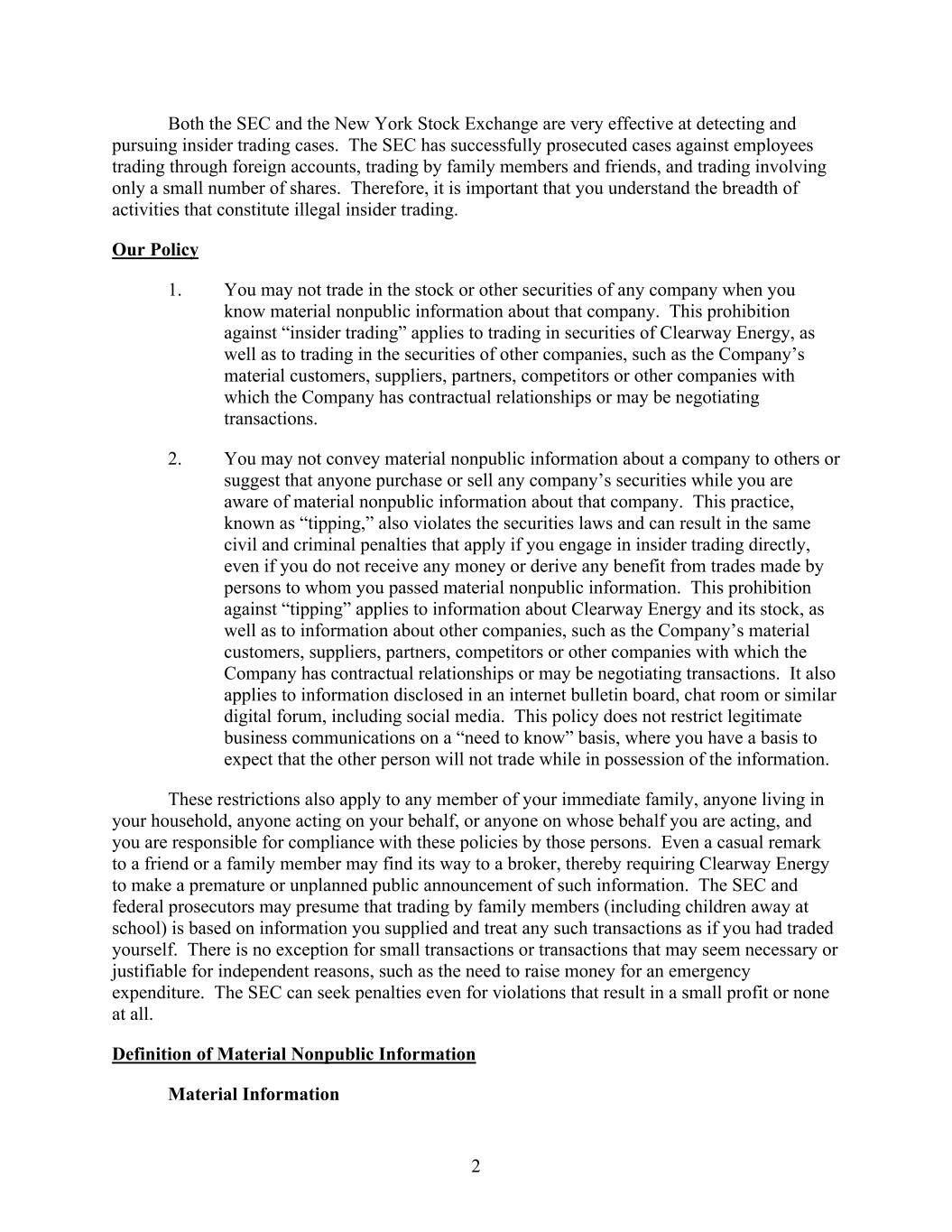
2 Both the SEC and the New York Stock Exchange are very effective at detecting and pursuing insider trading cases. The SEC has successfully prosecuted cases against employees trading through foreign accounts, trading by family members and friends, and trading involving only a small number of shares. Therefore, it is important that you understand the breadth of activities that constitute illegal insider trading. Our Policy 1. You may not trade in the stock or other securities of any company when you know material nonpublic information about that company. This prohibition against “insider trading” applies to trading in securities of Clearway Energy, as well as to trading in the securities of other companies, such as the Company’s material customers, suppliers, partners, competitors or other companies with which the Company has contractual relationships or may be negotiating transactions. 2. You may not convey material nonpublic information about a company to others or suggest that anyone purchase or sell any company’s securities while you are aware of material nonpublic information about that company. This practice, known as “tipping,” also violates the securities laws and can result in the same civil and criminal penalties that apply if you engage in insider trading directly, even if you do not receive any money or derive any benefit from trades made by persons to whom you passed material nonpublic information. This prohibition against “tipping” applies to information about Clearway Energy and its stock, as well as to information about other companies, such as the Company’s material customers, suppliers, partners, competitors or other companies with which the Company has contractual relationships or may be negotiating transactions. It also applies to information disclosed in an internet bulletin board, chat room or similar digital forum, including social media. This policy does not restrict legitimate business communications on a “need to know” basis, where you have a basis to expect that the other person will not trade while in possession of the information. These restrictions also apply to any member of your immediate family, anyone living in your household, anyone acting on your behalf, or anyone on whose behalf you are acting, and you are responsible for compliance with these policies by those persons. Even a casual remark to a friend or a family member may find its way to a broker, thereby requiring Clearway Energy to make a premature or unplanned public announcement of such information. The SEC and federal prosecutors may presume that trading by family members (including children away at school) is based on information you supplied and treat any such transactions as if you had traded yourself. There is no exception for small transactions or transactions that may seem necessary or justifiable for independent reasons, such as the need to raise money for an emergency expenditure. The SEC can seek penalties even for violations that result in a small profit or none at all. Definition of Material Nonpublic Information Material Information
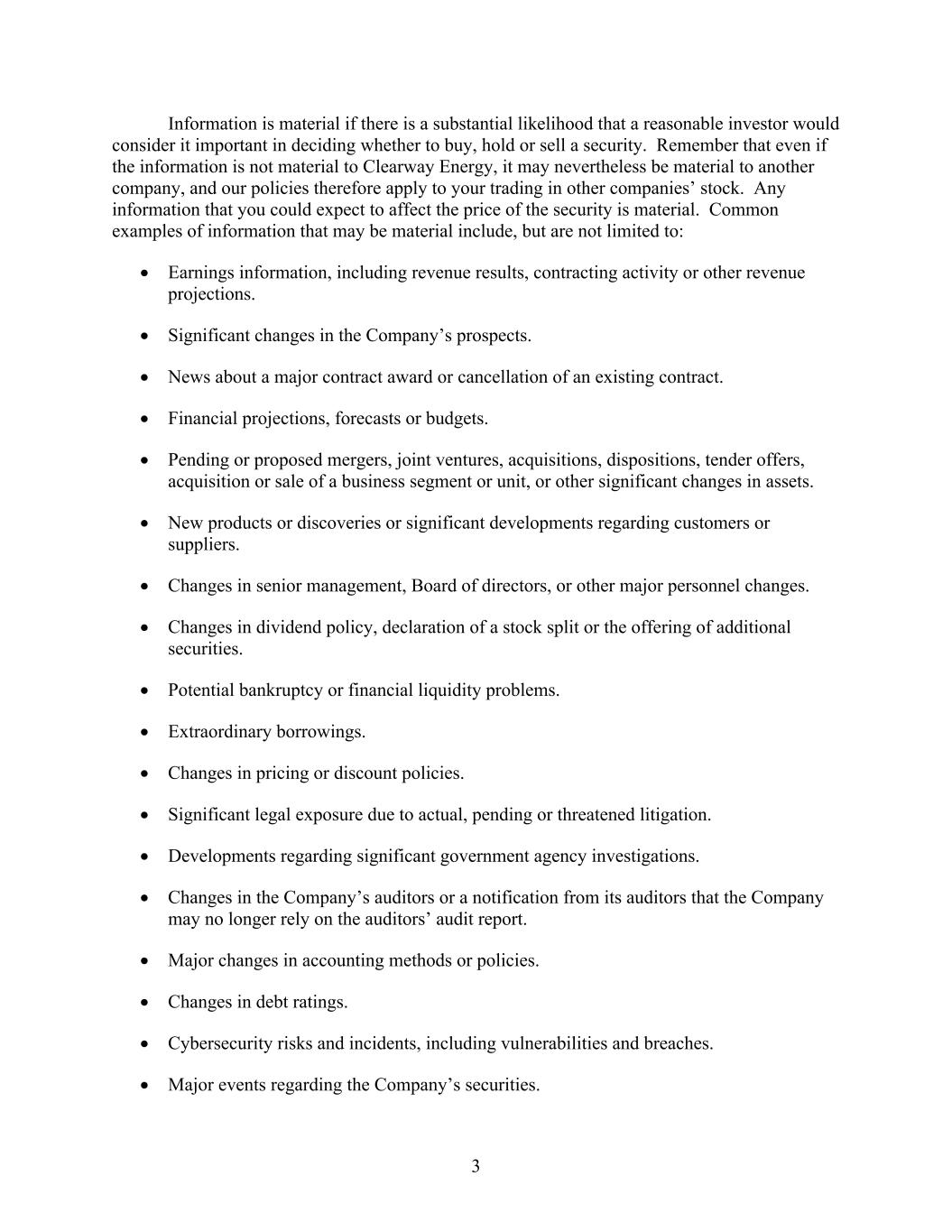
3 Information is material if there is a substantial likelihood that a reasonable investor would consider it important in deciding whether to buy, hold or sell a security. Remember that even if the information is not material to Clearway Energy, it may nevertheless be material to another company, and our policies therefore apply to your trading in other companies’ stock. Any information that you could expect to affect the price of the security is material. Common examples of information that may be material include, but are not limited to: Earnings information, including revenue results, contracting activity or other revenue projections. Significant changes in the Company’s prospects. News about a major contract award or cancellation of an existing contract. Financial projections, forecasts or budgets. Pending or proposed mergers, joint ventures, acquisitions, dispositions, tender offers, acquisition or sale of a business segment or unit, or other significant changes in assets. New products or discoveries or significant developments regarding customers or suppliers. Changes in senior management, Board of directors, or other major personnel changes. Changes in dividend policy, declaration of a stock split or the offering of additional securities. Potential bankruptcy or financial liquidity problems. Extraordinary borrowings. Changes in pricing or discount policies. Significant legal exposure due to actual, pending or threatened litigation. Developments regarding significant government agency investigations. Changes in the Company’s auditors or a notification from its auditors that the Company may no longer rely on the auditors’ audit report. Major changes in accounting methods or policies. Changes in debt ratings. Cybersecurity risks and incidents, including vulnerabilities and breaches. Major events regarding the Company’s securities.
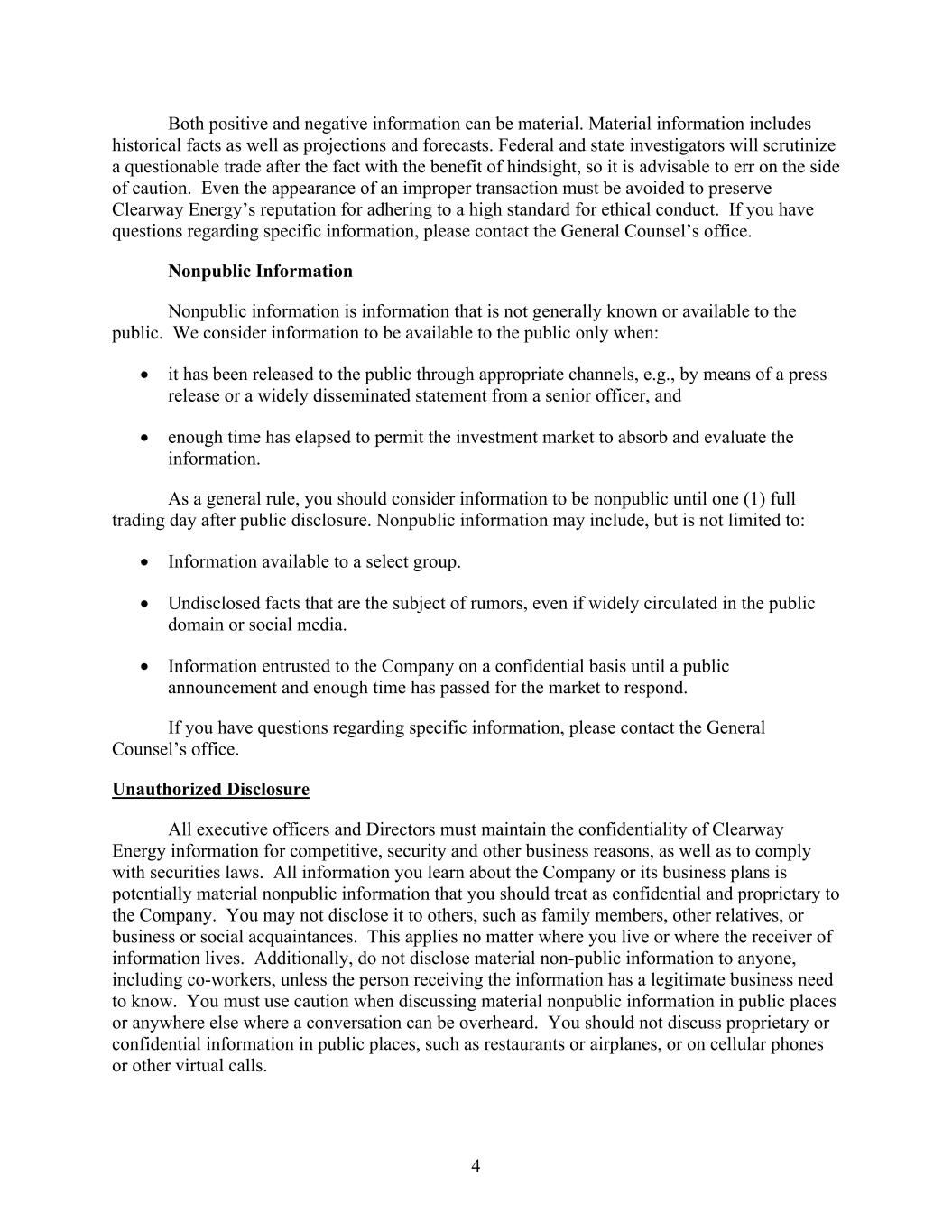
4 Both positive and negative information can be material. Material information includes historical facts as well as projections and forecasts. Federal and state investigators will scrutinize a questionable trade after the fact with the benefit of hindsight, so it is advisable to err on the side of caution. Even the appearance of an improper transaction must be avoided to preserve Clearway Energy’s reputation for adhering to a high standard for ethical conduct. If you have questions regarding specific information, please contact the General Counsel’s office. Nonpublic Information Nonpublic information is information that is not generally known or available to the public. We consider information to be available to the public only when: it has been released to the public through appropriate channels, e.g., by means of a press release or a widely disseminated statement from a senior officer, and enough time has elapsed to permit the investment market to absorb and evaluate the information. As a general rule, you should consider information to be nonpublic until one (1) full trading day after public disclosure. Nonpublic information may include, but is not limited to: Information available to a select group. Undisclosed facts that are the subject of rumors, even if widely circulated in the public domain or social media. Information entrusted to the Company on a confidential basis until a public announcement and enough time has passed for the market to respond. If you have questions regarding specific information, please contact the General Counsel’s office. Unauthorized Disclosure All executive officers and Directors must maintain the confidentiality of Clearway Energy information for competitive, security and other business reasons, as well as to comply with securities laws. All information you learn about the Company or its business plans is potentially material nonpublic information that you should treat as confidential and proprietary to the Company. You may not disclose it to others, such as family members, other relatives, or business or social acquaintances. This applies no matter where you live or where the receiver of information lives. Additionally, do not disclose material non-public information to anyone, including co-workers, unless the person receiving the information has a legitimate business need to know. You must use caution when discussing material nonpublic information in public places or anywhere else where a conversation can be overheard. You should not discuss proprietary or confidential information in public places, such as restaurants or airplanes, or on cellular phones or other virtual calls.
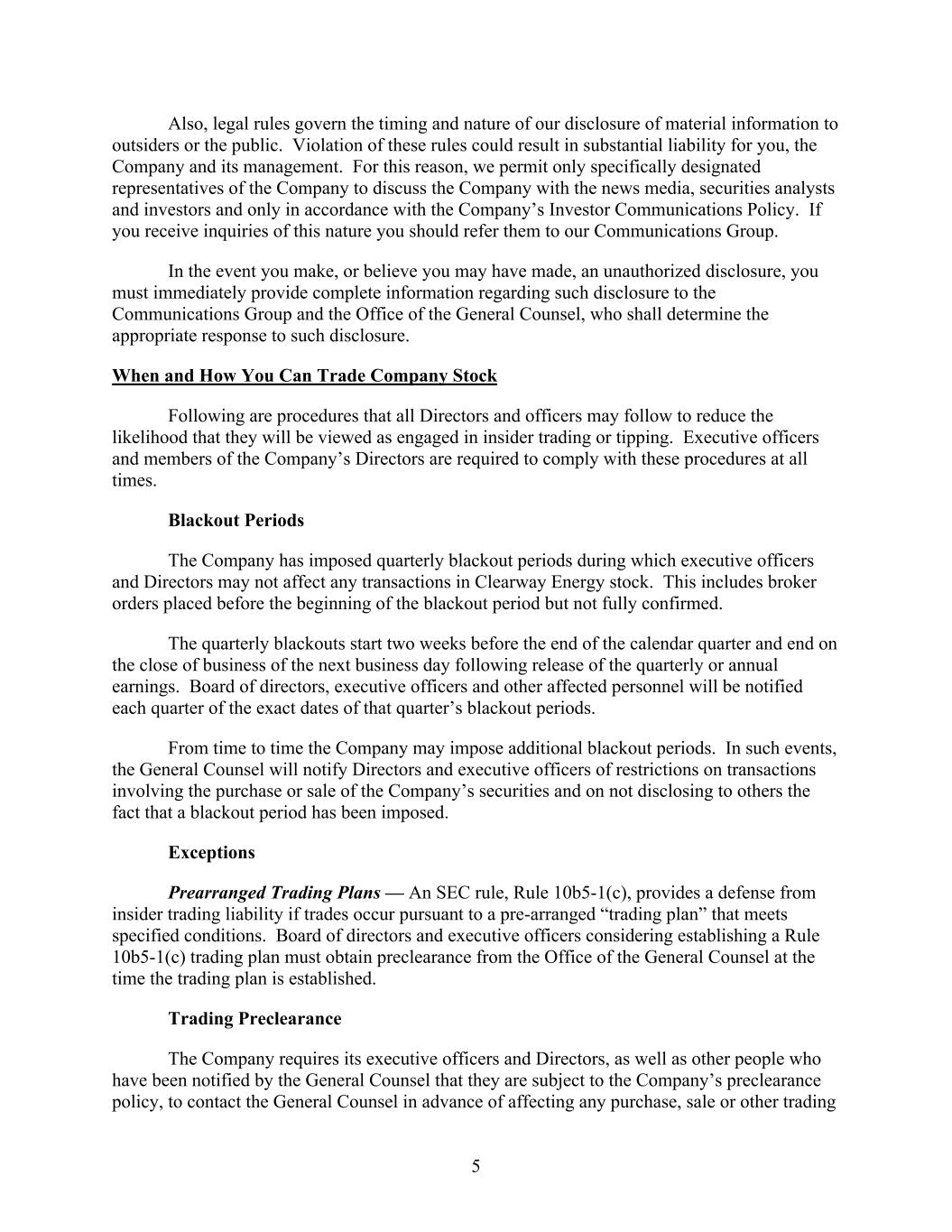
5 Also, legal rules govern the timing and nature of our disclosure of material information to outsiders or the public. Violation of these rules could result in substantial liability for you, the Company and its management. For this reason, we permit only specifically designated representatives of the Company to discuss the Company with the news media, securities analysts and investors and only in accordance with the Company’s Investor Communications Policy. If you receive inquiries of this nature you should refer them to our Communications Group. In the event you make, or believe you may have made, an unauthorized disclosure, you must immediately provide complete information regarding such disclosure to the Communications Group and the Office of the General Counsel, who shall determine the appropriate response to such disclosure. When and How You Can Trade Company Stock Following are procedures that all Directors and officers may follow to reduce the likelihood that they will be viewed as engaged in insider trading or tipping. Executive officers and members of the Company’s Directors are required to comply with these procedures at all times. Blackout Periods The Company has imposed quarterly blackout periods during which executive officers and Directors may not affect any transactions in Clearway Energy stock. This includes broker orders placed before the beginning of the blackout period but not fully confirmed. The quarterly blackouts start two weeks before the end of the calendar quarter and end on the close of business of the next business day following release of the quarterly or annual earnings. Board of directors, executive officers and other affected personnel will be notified each quarter of the exact dates of that quarter’s blackout periods. From time to time the Company may impose additional blackout periods. In such events, the General Counsel will notify Directors and executive officers of restrictions on transactions involving the purchase or sale of the Company’s securities and on not disclosing to others the fact that a blackout period has been imposed. Exceptions Prearranged Trading Plans — An SEC rule, Rule 10b5-1(c), provides a defense from insider trading liability if trades occur pursuant to a pre-arranged “trading plan” that meets specified conditions. Board of directors and executive officers considering establishing a Rule 10b5-1(c) trading plan must obtain preclearance from the Office of the General Counsel at the time the trading plan is established. Trading Preclearance The Company requires its executive officers and Directors, as well as other people who have been notified by the General Counsel that they are subject to the Company’s preclearance policy, to contact the General Counsel in advance of affecting any purchase, sale or other trading

6 of Company stock and to obtain prior approval of the transaction. To the extent this preclearance policy applies to any individual, it also applies to members of the individual’s immediate family, anyone living in the individual’s household, anyone acting on behalf of the individual or anyone on whose behalf the individual is acting. The preclearance policy does not apply to a stock option exercise if the option is to be exercised and no shares are to be sold, but it does apply to sales of stock issued upon the exercise of stock options, including same-day sales and cashless exercises. Any transaction that receives approval under the preclearance policy must be confirmed within two business days after the approval is obtained, but regardless may not be executed if you acquire material nonpublic information during that time. If a transaction is not confirmed within the two business day period, the transaction must be approved again before it is executed. If a proposed transaction is not approved under the preclearance policy, you should refrain from initiating any transaction in Company stock, and you should not inform anyone of the restriction. Reporting of Transactions SEC rules impose reporting obligations on executive officers, Directors and 10% shareholders. If there is any change in the beneficial ownership of Clearway Energy securities by such an insider, that person is generally required to file a Form 4 with the SEC reporting the change within two business days. Failure to timely file Form 4s results in disclosure of the delinquent filing in the Company’s proxy, or, in more serious cases, SEC enforcement actions or fines. While SEC rules impose the obligation for preparing and filing Form 4s upon the insider, the Company provides assistance in preparation and filing. “Short-Swing” Transactions Under SEC rules, profits realized through “short-swing transactions” by Directors or executive officers belong, with certain limited exceptions, to the Company. Generally, a “short- swing transaction” is any purchase and sale (or the converse) that takes place within a six-month period. The profit is computed using the highest sale price and lowest purchase price during the transaction period. Whether the insider had material nonpublic information at any point during the transaction period is immaterial. The Company or any of its equity shareholders may bring suit to allow the Company to recover the profit within two years of the insider’s realization of profit. Anti-Hedging Policy Employees, executive officers and directors may not, directly or indirectly, engage in any kind of hedging transaction that could reduce or limit their economic risk with respect to their holdings, ownership or interest in the securities of Clearway Energy, including without limitation outstanding stock options, stock appreciation rights or other compensation awards, the value of
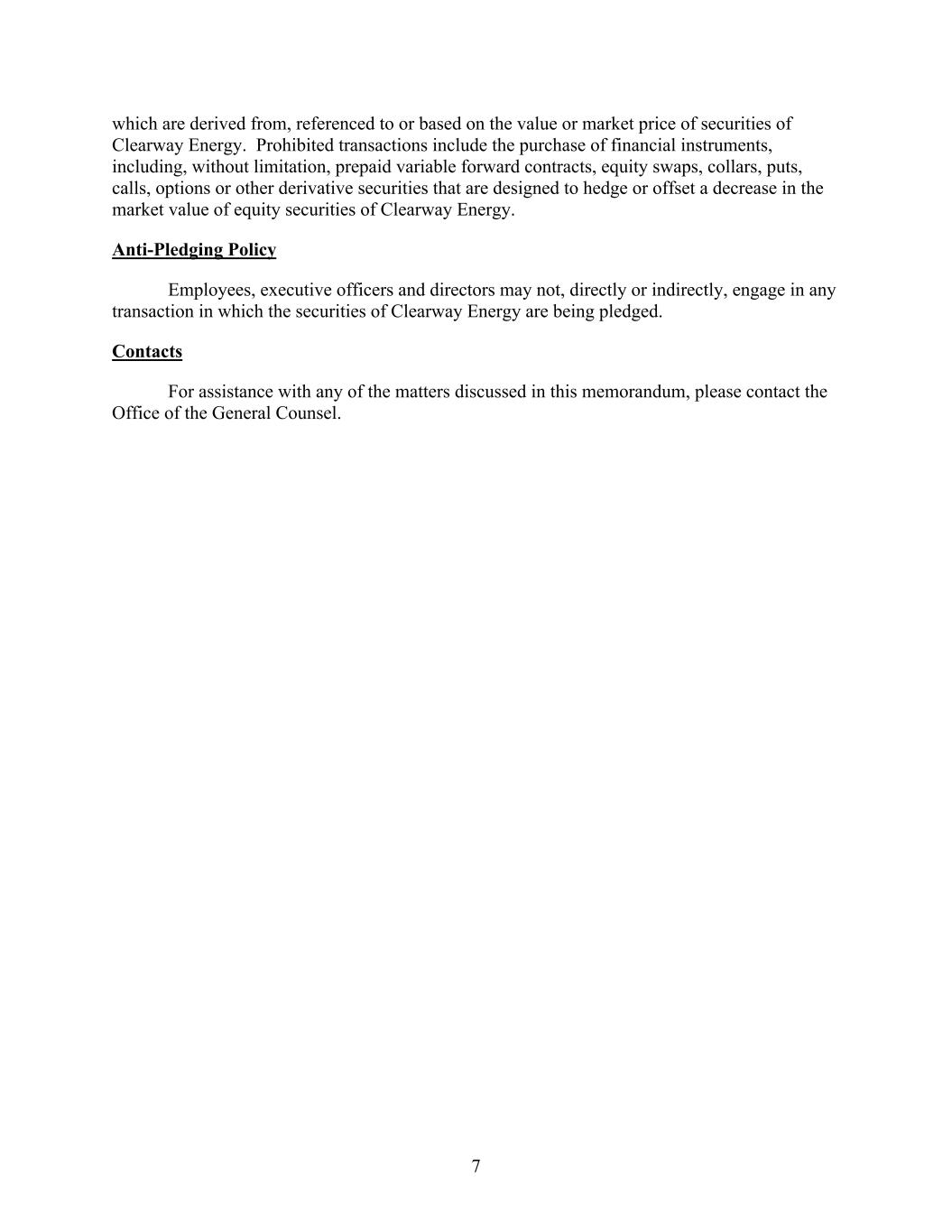
7 which are derived from, referenced to or based on the value or market price of securities of Clearway Energy. Prohibited transactions include the purchase of financial instruments, including, without limitation, prepaid variable forward contracts, equity swaps, collars, puts, calls, options or other derivative securities that are designed to hedge or offset a decrease in the market value of equity securities of Clearway Energy. Anti-Pledging Policy Employees, executive officers and directors may not, directly or indirectly, engage in any transaction in which the securities of Clearway Energy are being pledged. Contacts For assistance with any of the matters discussed in this memorandum, please contact the Office of the General Counsel.
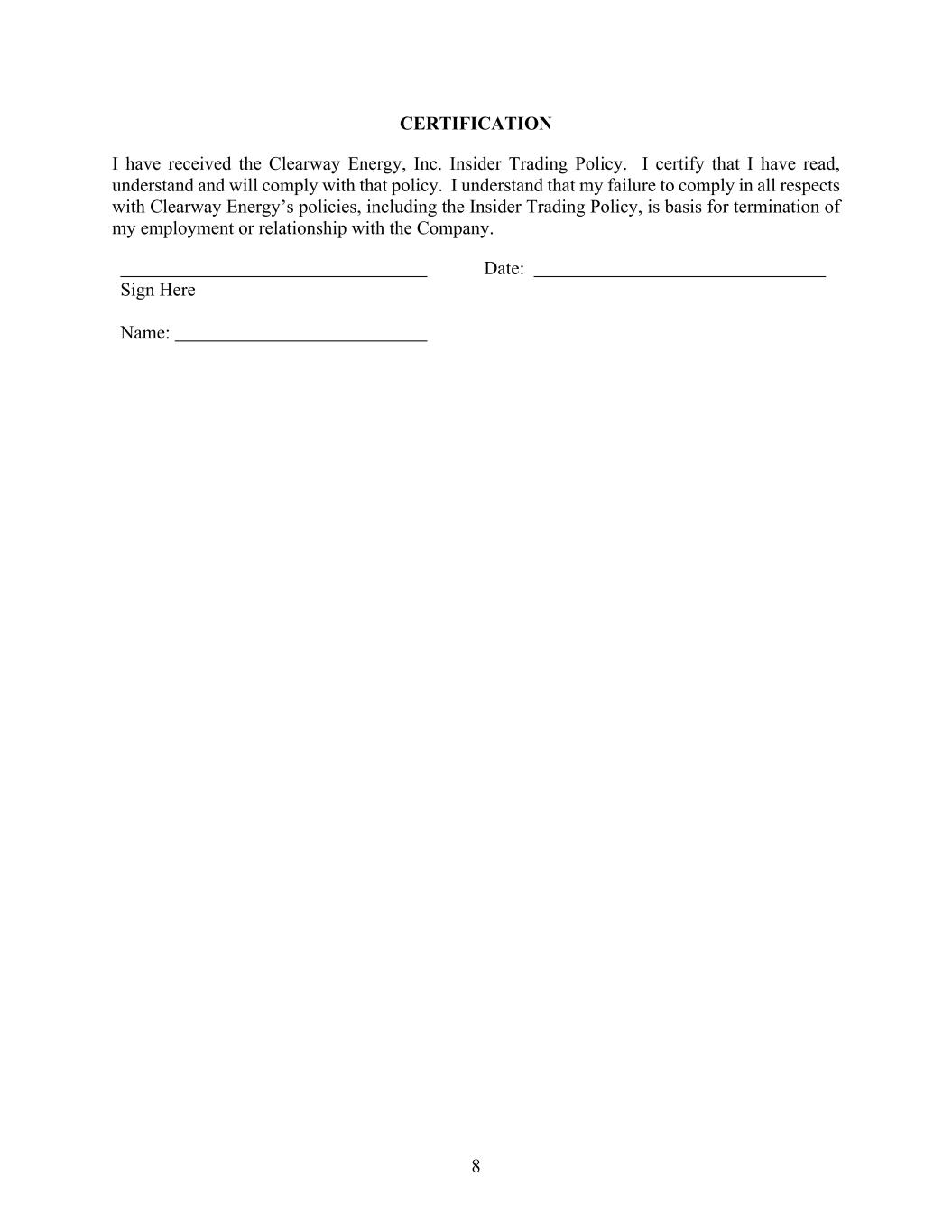
8 CERTIFICATION I have received the Clearway Energy, Inc. Insider Trading Policy. I certify that I have read, understand and will comply with that policy. I understand that my failure to comply in all respects with Clearway Energy’s policies, including the Insider Trading Policy, is basis for termination of my employment or relationship with the Company. Date: Sign Here Name:







